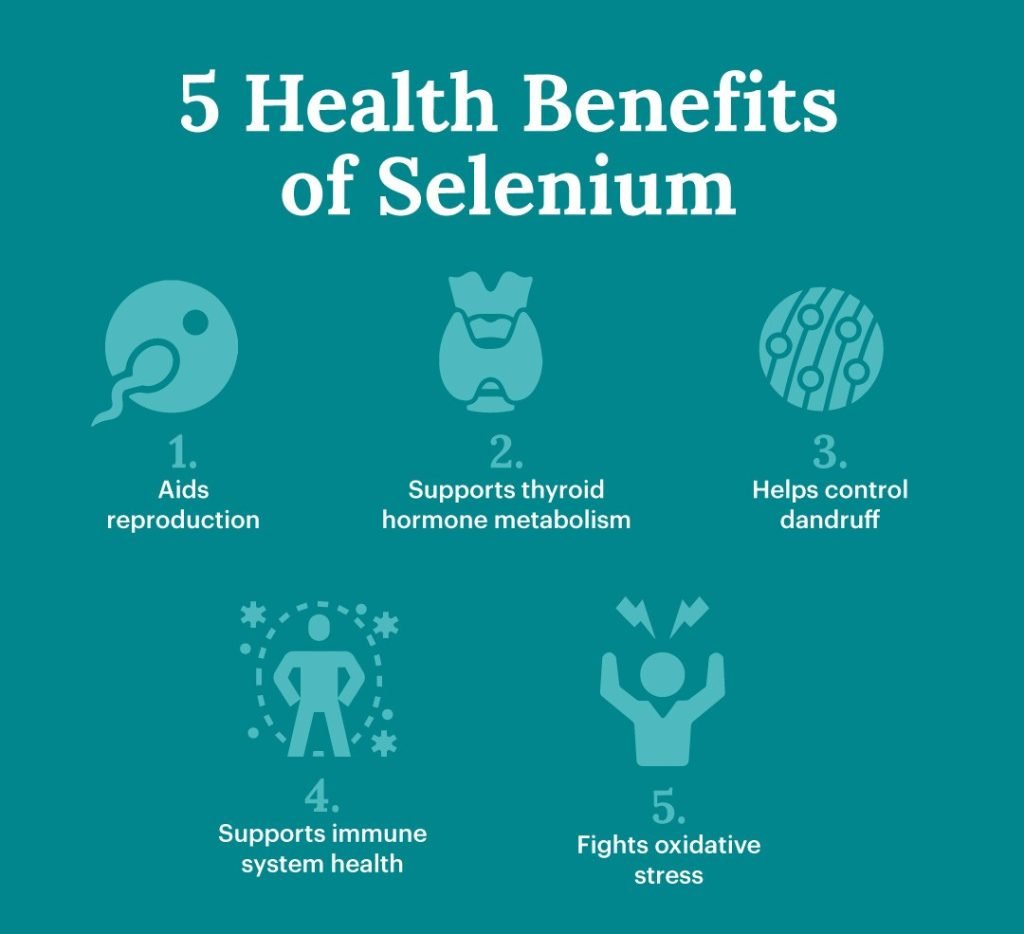Here are five of the top selenium benefits to look for when increasing your selenium intake.

1. Aids reproduction
Believe it or not, one of the primary selenium benefits is its ability to support reproductive health.
In fact, several scientific reports have noted that a deficiency in selenium is linked to infertility, miscarriage, preeclampsia, preterm labor, gestational diabetes, and more.
Furthermore, a 2015 study showed that selenium levels are higher in large healthy ovarian follicles. As a result, the researchers surmised that selenium could perform vital antioxidant functions for the ovaries during later follicular development.
2. Supports thyroid hormone metabolism
Another one of the major selenium benefits is that it supports your thyroid function. In fact, of all the organs in your body, your thyroid gland contains the highest amount of selenium per gram of tissue.
So, how does selenium support thyroid health? Well, studies have shown that when patients with autoimmune thyroiditis supplement with selenium for three months, they experienced reduced thyroid antibody levels and improved thyroid ultrasound features.
The patients even reported better mood and general wellbeing, resulting in improved quality of life.
Additionally, a 2011 study revealed that selenium benefits the thyroid by lowering the risk of enlargement. According to the study, being low in selenium increases the risk of developing both an enlarged thyroid gland and multiple thyroid nodules.

3. Helps control dandruff
Amazingly, selenium benefits also extend to supporting the health of your skin—specifically, your scalp.
Researchers have found that applying selenium sulfide topically to the scalp can help to control dandruff. This effect is achieved thanks to selenium sulfide’s anti-fungal properties. [8]
In fact, according to a study on 180 patients with moderate-to-severe dandruff, 93 percent of the patients reported significant improvements in dandruff. After two months, 88 percent reported that the improvements remained.
There are many selenium sulfide shampoos on the market today, so if you find that you’re in need of some anti-dandruff support, consider trying one for a little relief.
4. Supports immune system health
Perhaps of significant interest right now is the fact that selenium benefits immune system health as well.
It’s long been known in the scientific and medical communities that having adequate selenium levels are crucial for maintaining optimal immunity. But they also help to regulate immune responses and chronic inflammation to keep either from overacting.
Studies have shown that selenium positively impacts the barriers to infection in the immune system, while a selenium deficiency impairs their function.
Specifically, selenium has been shown to strengthen the body’s epithelial barriers (barriers composed of epithelial cells, tight junctions, and a mucus layer that not only regulated nutrient absorption but also helps stop invasive bacteria from entering the body.
Additionally, selenium deficiency has been linked to a higher risk of contracting viral illnesses, such as the flu.
In fact, studies have shown that being deficient in selenium results in greater lung problems in those with the flu than in those who have adequate amounts of selenium in their bodies!
5. Fights oxidative stress
Finally, selenium benefits your body by also fighting oxidative stress. As you may recall, oxidative stress is an imbalance of free radicals and antioxidants in your body that leads to cellular damage.
Because it’s often caused by inflammation, it’s linked to the development of many of today’s chronic illnesses, such as diabetes, heart disease, cancer, and more. And since selenium is a powerful antioxidant, it’s known to help fight the free radicals that cause oxidative stress.
Accordingly, studies have found that supplementing with selenium can help to reduce DNA damage and even reduce cancer risk!
In fact, a 2016 meta-analysis revealed that having high selenium levels was linked to a decreased risk of breast cancer, lung cancer, esophageal cancer, gastric cancer, and prostate cancer.
Additionally, according to 2019 study on 94 patients with type 2 diabetes, supplementing with 200 μg of selenium daily helped to improve their glycemic and lipidemic profiles.
